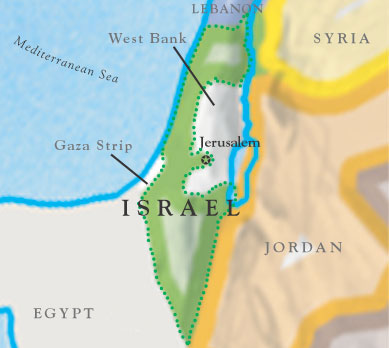Majority of Israelis behind Israeli offensive
 Tel Aviv - Most Israelis strongly support their country's deadly and destructive offensive against Hamas in Gaza.
Tel Aviv - Most Israelis strongly support their country's deadly and destructive offensive against Hamas in Gaza.
The Israeli campaign against the radical Islamic movement ruling the strip, as well as its reprisal rocket attacks against southern Israeli cities such as Ashkelon, Ashdod and Beersheba, are at the forefront of the Israeli media's reporting.
The large number of Palestinian civilian casualties, while mentioned, are pushed to the background.
Some critical voices can be heard, but they are a marginal minority.
According to an opinion poll published Friday in Israel's Ma'ariv daily, over 93 per cent of Israelis support the Gaza offensive, while only 2.2 per cent "fairly" oppose it and another 1.7 per cent are "very much" against it.
Backing for its ground component is less broad: Under 42 per cent of Israelis support it, according to the Ma'ariv poll.
As past experience teaches, public opinion could well turn around, if the ground invasion - begun Saturday after more than a week of relentless airstrikes - starts taking a high toll among Israeli soldiers.
While the Palestinian toll stands at well over 500 dead and at least 2,500 injured, the Israeli toll has so far been minimal - four Israelis died in rocket attacks and one soldier died in the ground fighting by Monday afternoon. Dozens were wounded.
Both the Palestinian and Israeli media focus all but exclusively on the casualties and suffering on their own respective sides, with Israeli television channels broadcasting exhaustively about the impact of each rocket which lands in the south of the country.
The grisly footage shot for example by the Palestinian Ramattan news agency of Saturday afternoon's deadly airstrike at a mosque in northern Gaza's Beit Lahiya was aired also on Israeli television, but only briefly and in between lengthy reports about the Palestinian rocket attacks and analyses by Israeli experts commenting on the offensive.
Israelis widely feel the Gaza assault is justified: Israel did not want this war, but Hamas asked for it. Gaza's civilian population are now also paying the price for voting the radical Islamic movement into power, is a much-heard opinion.
After Israel's unilateral withdrawal from Gaza in 2005, the strip could have had a flourishing seaport, as well as an airport. Instead, its militants fired rockets and mortar shells into Israel on an almost daily basis and as a result brought a paralyzing economic blockade on themselves and the entire strip, many argue when asked.
Gaza's former Jewish settlements could have seen high-rise residential buildings providing housing for many of the densely-populated strip, but are instead used as training camps and rocket launching sites by Hamas, they point out.
Former Israeli premier Ariel Sharon would turn in his hospital bed if he knew what was going on, decries one Israeli in Tel Aviv, Yaffa Uriel: "He gave Gaza back without taking anything in return. 'Here, take,' he just told them. And what did we get? Rockets."
She continues angrily: "The world shouldn't only watch when Israel attacks. The world should have watched also when for eight years the residents (of southern Israel) suffered.
"I do feel sorry about the innocent civilians," she acknowledges, speaking from her office supplies store. "They are the ones who suffer in the end. Under conditions like those in Gaza, it is almost impossible not to harm them - out of a lack of choice, not because we want it. It's so crowded there."
Efi Sharabin, 37, agrees. "It's good that (Israel) is doing this. It had to be done." He speaks from a nearby fast food restaurant, whose owner, Aviv Shalabi, plunges into the discussion uninvited:
If Israel did not do it today, it would have had to do it tomorrow, argues the 49-year-old. "It is about time they (the army) went in and crushed them (Hamas)."
At least it will buy us a few years quiet, he sighs, arguing that if left unchallenged, Hamas could have acquired rockets reaching as far as Tel Aviv. "They are already reaching 40 kilometres into Israel. It's just another 20 kilometres."
Some criticism can nevertheless be heard. Reporters Gideon Levy and Amira Hass of the left-liberal Ha'aretz daily are among the few who report extensively about the Palestinian suffering, with Levy accusing the Israeli media of providing disinformation.
"The media is failing abysmally," says Levy. "It has enlisted voluntarily to brain wash and to hide what needs to be hidden. They systematically show how once again we are the only victims."
On Saturday night, some 1,000 Israelis - waving both Israeli and Palestinian flags and some of them wearing Arab head scarfs - attended a protest on Tel Aviv's central Rabin square, organized by Hadash, the only mixed Arab-Jewish party in Israel's parliament. Some 600 people attended a counter-demonstration nearby, waving Israeli flags and chanting slogans in support of the Israeli military. (dpa)